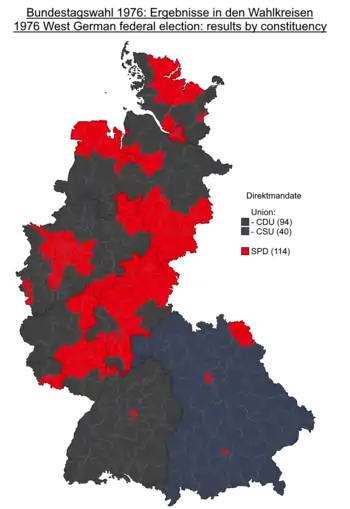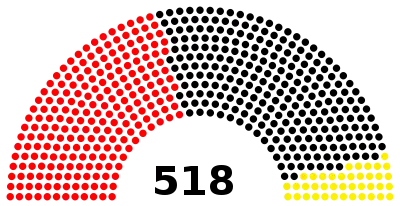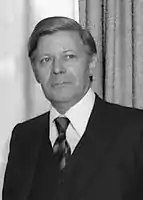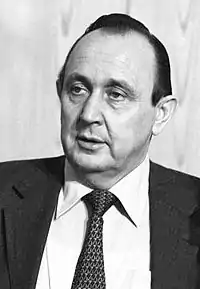1976 West German federal election
Federal elections were held in West Germany on 3 October 1976 to elect the members of the eighth Bundestag. Although the CDU/CSU alliance became the largest faction in parliament, Helmut Schmidt of the Social Democratic Party remained Chancellor.
| |||||||||||||||||||||||||||||||||||||||||||||
All 518 seats in the Bundestag 260 seats needed for a majority | |||||||||||||||||||||||||||||||||||||||||||||
|---|---|---|---|---|---|---|---|---|---|---|---|---|---|---|---|---|---|---|---|---|---|---|---|---|---|---|---|---|---|---|---|---|---|---|---|---|---|---|---|---|---|---|---|---|---|
| Registered | 42,058,015 | ||||||||||||||||||||||||||||||||||||||||||||
| Turnout | 38,165,753 (90.7%)[1] | ||||||||||||||||||||||||||||||||||||||||||||
| |||||||||||||||||||||||||||||||||||||||||||||
 Results by constituency for the first votes. Grey denotes seats won by the CDU/CSU; red denotes seats won by the SPD. | |||||||||||||||||||||||||||||||||||||||||||||
| |||||||||||||||||||||||||||||||||||||||||||||
Campaign
The coalition of the SPD and the FDP wanted to be re-elected, with the SPD, since 1974 led by Helmut Schmidt, the party's candidate for Chancellor. The CDU and the CSU tried to achieve an absolute majority of the votes to make CDU chairman Helmut Kohl Chancellor.
Results
 | ||||||||||||||||
| Parties | Constituency | Party list | Total seats | |||||||||||||
|---|---|---|---|---|---|---|---|---|---|---|---|---|---|---|---|---|
| Votes | % | +/− | Seats | +/− | Votes | % | +/− | Seats | +/− | Seats† | +/− | % | ||||
| Social Democratic Party (SPD) | 16,471,321 | 43.7 | −5.2 | 114 | −38 | 16,099,019 | 42.6 | −3.2 | 100 | +22 | 224 | −18 | 43.2 | |||
| Christian Democratic Union (CDU) | 14,423,157 | 38.3 | +2.6 | 94 | +29 | 14,367,302 | 38.0 | +2.8 | 96 | −18 | 201 | +15 | 38.8 | |||
| Christian Social Union (CSU) | 4,008,514 | 10.6 | +0.9 | 40 | +9 | 4,027,499 | 10.6 | +0.9 | 13 | −4 | 53 | +5 | 10.2 | |||
| Free Democratic Party (FDP) | 2,417,683 | 6.4 | +1.6 | 0 | ±0 | 2,995,085 | 7.9 | −0.5 | 39 | −2 | 40 | −2 | 7.7 | |||
| National Democratic Party (NPD) | 136,028 | 0.4 | −0.1 | 0 | ±0 | 122,661 | 0.3 | −0.3 | 0 | ±0 | 0 | ±0 | 0 | |||
| German Communist Party (DKP) | 170,855 | 0.5 | +0.1 | 0 | ±0 | 118,581 | 0.3 | ±0 | 0 | ±0 | 0 | ±0 | 0 | |||
| Communist Party of Germany (KPD-AO) | 8,822 | 0.0 | +0.0 | 0 | ±0 | 22,714 | 0.1 | +0.1 | 0 | ±0 | 0 | ±0 | 0 | |||
| Action Community of Independent Germans (AUD) | 19,490 | 0.1 | +0.1 | 0 | ±0 | 22,202 | 0.1 | +0.1 | 0 | ±0 | 0 | ±0 | 0 | |||
| Communist League of West Germany (KBW) | 21,414 | 0.1 | +0.1 | 0 | ±0 | 20,018 | 0.1 | +0.1 | 0 | ±0 | 0 | ±0 | 0 | |||
| European Workers' Party (EAP) | 3,177 | 0.0 | +0.0 | 0 | ±0 | 6,811 | 0.0 | +0.0 | 0 | ±0 | 0 | ±0 | 0 | |||
| Christian Bavarian People's Party (CBV) | 4,876 | 0.0 | +0.0 | 0 | ±0 | 6,720 | 0.0 | +0.0 | 0 | ±0 | 0 | ±0 | 0 | |||
| International Marxist Group (GIM) | 2,037 | 0.0 | +0.0 | 0 | ±0 | 4,759 | 0.0 | +0.0 | 0 | ±0 | 0 | ±0 | 0 | |||
| Action Community Fourth Party (AVP) | 2,636 | 0.0 | +0.0 | 0 | ±0 | 4,723 | 0.0 | +0.0 | 0 | ±0 | 0 | ±0 | 0 | |||
| 5%-Block | 985 | 0.0 | +0.0 | 0 | ±0 | 2,940 | 0.0 | +0.0 | 0 | ±0 | 0 | ±0 | 0 | |||
| Independent Workers' Party (UAP) | 499 | 0.0 | +0.0 | 0 | ±0 | 765 | 0.0 | +0.0 | 0 | ±0 | 0 | ±0 | 0 | |||
| United Left (VL) | 217 | 0.0 | +0.0 | 0 | ±0 | 701 | 0.0 | +0.0 | 0 | ±0 | 0 | ±0 | 0 | |||
| RFP | 227 | 0.0 | +0.0 | 0 | ±0 | – | – | – | – | – | 0 | ±0 | 0 | |||
| Electoral groups and independents | 3,706 | 0.0 | ±0 | 0 | ±0 | – | – | – | – | – | 0 | ±0 | 0 | |||
| Invalid/blank votes | 470,109 | — | — | — | — | 343,253 | — | — | — | — | — | — | — | |||
| Totals | 38,165,753 | 100 | ±0.0 | 248 | ±0 | 38,165,753 | 100 | ±0.0 | 248 | ±0 | 518 | ±0 | ±0 | |||
| Registered voters/turnout | 42,058,015 | 90.7 | — | — | — | 42,058,015 | 90.7 | — | — | — | — | — | — | |||
| Source: Federal Returning Officer | ||||||||||||||||
- ^† — includes the non-voting delegates for West Berlin (11 CDU, 10 SPD, 1 FDP).
| 224 | 40 | 254 |
| SPD | FDP | CDU/CSU |
Aftermath
The coalition between the SPD and the FDP remained in government, with Helmut Schmidt as Chancellor. Between the "sister parties" of CDU and Bavarian CSU there emerged a critical conflict, as the CSU leader Franz Josef Strauß wanted to break both the united Bundestag group of the parties and the agreement not to compete against each other in any Land. Later, this attack was withdrawn, while Strauß became candidate for chancellor for the 1980 elections.
Notes
- Schmidt succeeded Willy Brandt as Chancellor on 16 May 1974, but did not become leader of the SPD.
References
- "Voter turnout by election year". Website of the Federal Returning Officer's Office. The Federal Returning Officer. Archived from the original on 7 November 2014. Retrieved 7 November 2014.
External links
 Media related to 1976 Germany Bundestagswahl at Wikimedia Commons
Media related to 1976 Germany Bundestagswahl at Wikimedia Commons
.jpg.webp)

